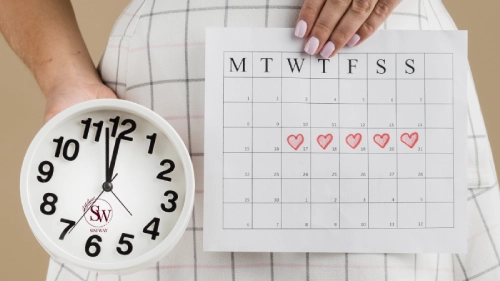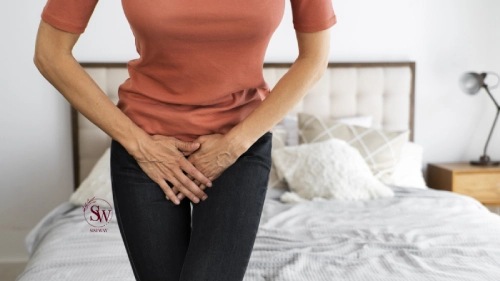What Causes Period Delay?

A woman’s menstrual cycle is a complex and delicately balanced biological process that is influenced by various factors. For many women, the regularity of their menstrual cycle serves as an important indicator of overall reproductive health. However, experiencing a delay in one’s period can be a cause for concern and often prompts questions about the underlying causes. In this comprehensive article, we will delve into the various factors that can contribute to period delays, shedding light on this common yet sometimes puzzling phenomenon.
- Hormonal Imbalances
The intricate dance of hormones plays a pivotal role in regulating the menstrual cycle. Any disruption in the balance of hormones, particularly estrogen and progesterone, can lead to irregularities. Conditions such as polycystic ovary syndrome (PCOS) and thyroid disorders are known to cause hormonal imbalances, resulting in delayed or irregular periods.

- Stress: A Silent Menstrual Disruptor
The impact of stress on the body is profound, and the menstrual cycle is not immune to its effects. Elevated stress levels can interfere with the normal functioning of the hypothalamus, a part of the brain that regulates the menstrual cycle. Chronic stress may lead to hormonal imbalances and, consequently, delayed periods.
- Diet and Nutrition
The importance of a well-balanced diet cannot be overstated when it comes to maintaining a healthy menstrual cycle. Nutrient deficiencies, particularly in iron and vitamin B12, can affect the production of red blood cells and lead to irregular periods. Additionally, extreme weight loss or gain can disrupt hormonal balance, contributing to period delays.
Also Read: Should Women Wear Underwear to Bed
- Intense Exercise
While regular exercise is crucial for overall health, excessive and intense physical activity can have repercussions on the menstrual cycle. Athletes and individuals engaging in strenuous workouts may experience disruptions in their periods due to alterations in hormonal levels. Striking a balance between exercise and rest is essential for menstrual regularity.

- Medications and Birth Control
Certain medications, including some forms of birth control, can influence the menstrual cycle. Discontinuation of hormonal contraceptives, in particular, may lead to a temporary delay in periods as the body adjusts to the change. It is essential to be aware of the potential side effects of medications and their impact on menstrual health.
- Medical Conditions
Various medical conditions, such as diabetes, endometriosis, and pelvic inflammatory disease, can contribute to period delays. It is crucial to address and manage these underlying health issues to restore menstrual regularity.
- Age and Puberty
For adolescent girls, irregular periods are often part of the natural course of puberty. It may take some time for the menstrual cycle to establish a regular pattern. On the other end of the spectrum, approaching menopause can also bring about changes in menstrual regularity as hormone levels fluctuate.
Would a Yeast Infection Delay Your Period?
Infections, particularly those affecting the reproductive system, can also play a role in period delays. One common concern is whether a yeast infection, caused by the overgrowth of Candida, can influence the menstrual cycle. While yeast infections primarily affect the vaginal area and do not directly interfere with the menstrual cycle, the body’s response to the infection may contribute to perceived delays.

Yeast infections can cause discomfort, inflammation, and changes in vaginal discharge. In some cases, the body’s immune response to the infection may induce stress, potentially affecting the hormonal balance and leading to a delay in the menstrual cycle. It’s important to note that any significant disruption in the menstrual cycle should prompt consultation with a healthcare professional to rule out other potential causes and address the infection promptly.
FAQ:
-
- Can stress cause permanent changes in the menstrual cycle?
While stress can temporarily disrupt the menstrual cycle, it is usually reversible. Managing stress through relaxation techniques and a healthy lifestyle can help restore normal menstrual function. - How long should one wait before seeking medical advice for a delayed period?
If a woman experiences persistent irregularities or a delay in her menstrual cycle for more than three consecutive months, it is advisable to consult a healthcare professional for a thorough evaluation. - Can certain foods help regulate the menstrual cycle?
A balanced diet rich in essential nutrients can support overall reproductive health. While specific foods may not directly regulate the menstrual cycle, maintaining a healthy diet contributes to overall well-being. - Is it normal for menstrual irregularities to occur during perimenopause?
Yes, it is common for women approaching menopause to experience irregular periods due to hormonal fluctuations. However, any significant changes or concerns should be discussed with a healthcare provider.
Conclusion
Understanding the diverse factors that can contribute to period delays empowers women to take charge of their reproductive health. By addressing lifestyle factors, managing stress, and seeking timely medical advice, individuals can work towards achieving a more regular and predictable menstrual cycle. It is essential to approach period delays with a holistic perspective, considering both physical and emotional well-being for a healthier reproductive life.




